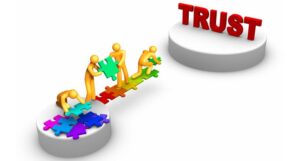Trust serves as the foundational element upon which all relationships are constructed. Trust is the glue that binds two people together — be it a fresh relationship or a long-dated one. So how do you foster and nurture this key ingredient in your relationship? With this guide, we lay out your blueprint for comprehension, cultivation and construction of the bonds of trust.
Build Trust As A Foundation For Each Relationship
Trust is not just another part of a relationship; it is the filing cabinet. When there is no trust, everything else starts to lose its importance: intimacy disappears, communication gets stunted and doubt creeps in. Trust gives both partners the freedom to be vulnerable with one another without feeling as if they will get judged or betrayed. The essence of love, trust foster healthy relationships as partners feel safe and appreciated which further strengthens emotional bonding.
Creating trust is not something that you do once, it is a continual process and requires work on both sides of the partnership. Even in the minutia, every touch point adds to your trust stock. When partners recognize this dynamic, they can make choices that are intentional in building trust instead of subconsciously sabotaging it. If you are in it for the long haul, trust is part of growing a lasting relationship.
Trust is undoubtedly one of the most important factors. A thick skin helps in absorbing the inevitable wear and tear, misunderstandings etc between two people. Trust, as a core value, brings partners through the storms of relationship with resilience and grace, assured that their bond is based on respect for one another and dedication to seeing the union survive. \

Recognising the Role of Communication
Building trust is only done with communication. When partners can communicate their thoughts, feelings and needs freely in a straightforward, honest way, then they have already taken the first step to having a healthy relationship. By being transparent, this minimizes confusion and creates a more secure environment. Healthy communication between partners shows awareness and respect for one another, which sets the stage for trust to have a chance to prosper.
Equally important as speaking is listening. Active listening involves without interrupting your partner, being engaged in what they are saying and not preplanning how to respond while they’re talking. It indicates that you appreciate their perspective and make an effort to understand how they discover. Communication becomes a bridge not a barrier when both partners feel heard and understood.
Delay is death when it comes to addressing these questions, but as the old saying goes, “You need to nip this in the bud.” Not having the hard conversations due to fear or discomfort only breeds resentment and unhappiness. Sticking with a problem enables partners to look beyond the ‘feeling’ level and establish confidence in how they’ll work through the various things life can throw at them together.
The Art of Being Consistent
Trust relies on verbal and non-verbal consistency. Doing what you said you will do teaches your partner to trust that you will follow through. Consistency: Are you reliable and predictable in your actions, making it easier for others to trust you?
Consistency is sticking with your values and principles – those things that are most important to you. The trust bond gets a boost if partners share similar core values as it is easier to create an idea of where each stands. That does not mean you have to be in agreement about everything, but yu do need to respect one another and commitments.
To the contrary, inconsistency can lead to doubt. Confusion and mistrust happen when actions do not meet words. In order to avoid this trap, practice being reliable in your daily exchanges — sending the message that your partner can count on you.
Honesty as the Best Policy
Lying is the backbone of trust. Honesty about your motives, emotions, and errors brings an atmosphere of transparency and loyalty. A safe haven in which honesty reigns if both partners practice it, a commitment to not get hurt whatsoever.
Honesty matters even when it hurts. Even if it is a hard thing to admit, hiding some truths can seem like the noble thing to do in order not hurt your partners feelings but eventually this will come back to bite you by leading a erosion of trust over time. Being forthright is a mark of respect and courage, and both go a long way in building trust.
Further, and on a more positive note, honesty builds the expectation of another honest return. So, if you lead by example, your partner is more likely to be honest as well and the cycle continues. After all, trust is not about the absence of mistakes — it is about honest vulnerability.
Sailing the Uncertain Seas of Vulnerability
Vulnerability is one of the most misunderstood things when it comes to relationships — many people think that being vulnerable makes you weak, but in actual fact being vulnerable and opening up is how we create trust. Opening up about your fears, dreams, and insecurities encourages your partner to do the same, cultivating emotional intimacy. Two people being vulnerable and open creates an understanding of each other that strengthens trust.
To be vulnerable is to be brave and take a risk. Put out a little effort to get uncomfortable and let your partner see the real you. Being this open can be scary, but also very rewarding as it creates space for real intimacy.
Vulnerability is cultivated by creating an environment in which your partner feels safe to let down their walls. Be an empathetic listener, be supportive and do not judge. When you nurture that space, it becomes a circle of vulnerability and builds trust into your relationship.
Rebuilding Trust Once Lost
Trust can be delicate, and especially when it is eroded the path to healing may be difficult. Recognizing the breach and taking responsibility for it is the first step in rebuilding trust. This means heartfelt apologies and reparations. Acknowledging wrongs is an indication of how much the relationship means to you and that you will take steps towards fixing it.
But rebuilding trust is not an overnight process, it takes time and patience. One needs to have faith that the changes will eventually happen, although it may take longer than expected and some relapse might follow. It certainly takes a lot of time and requires self-dedication to rebuild trust, open up communication channels again, but at the end of day deeds matter more than words.
Couples therapy can help especially when the issue is a complicated one of trust. Having a neutral third party can help in ensuring that guidance and strategies for rebuilding trust are implemented so that the partners can move ahead with renewal and commitment combined.
Building Respect and Setting Boundaries
Having boundaries is a healthy relational need. They set the boundaries of what is permissible and what is not, thus creating a structure around trust to form. Boundaries show that a partner cares about each other’s well-being and the other person’s independence by setting them and respecting them.
Respecting your partner’s boundaries requires active listening and respecting each other’s limits. If you’re in a relationship, understanding that your partner has differently needs and preferences to you and being mindful. That reciprocal esteem creates trust through reinforcing safety and acceptance.
Equally important is the way you express what your boundaries are and that they are firm. And this transparency means that both partners are on the same page, thereby significantly reducing chances of misunderstandings and frequent conflicts. When boundaries are honored, intimacy grows between partners as both partners feel seen and cared for.
Creating Trust by Sharing Experiences
Having things in common is the most effective way to develop trust in a relationship. When you go through life experiences, whether it’s a trip or hobby or fending off something together, you work as a team and that creates companionship. These moments create memories that can enhance the emotional bond and trust in each other.
Teamwork interactions create avenues to learn one another’s strengths and weakness. This knowledge increases understanding and compassion, creating a foundation for greater trust. Facing new things together builds trust and confidence in each others abilities to weather the storms of life.
Besides, common experiences create a sense of belonging and togetherness. They stress the common mission and beliefs partners have with each other, reinforcing the feeling that they are on the same side. That congruence deepens trust and leads to further growth in the relationship.

Forgiveness and Compassion Exercise
It is important to recognize that forgiveness also plays a part in trusting people. Grudges and past mistakes can be toxic and create bitterness and resentment within a relationship. When partners practice forgiveness, they can still march forward without having the pain of the past be in their way.
Forgiveness is possible when there is compassion, right? When you consider what your partner may be feeling and try to think as they do, it heightens empathy and compassion. Such compassion creates an underlying bond, helping to cultivate a more forgiving spirit which helps to strengthen trust.
It does not mean to forget about or excuse the behavior that may have harmed you. This means realizing that those actions hurt, learning from it and choosing to put the relationship’s future above its past. When partners exercise forgiveness and compassion, they build an robust trust that can survive whatever life throws at them.
Trust as a Continuous Journey
Trust is not a destination you arrive at in a relationship. This takes diligence, introspection and adjusting to the course of where your partnership evolves. By thinking of trust as a journey, it empowers both partners to continue cultivating trusting behaviour throughout their relationship.
Monitor your relationship trust levels and areas in need of work. Maintaining trust is an invaluable tool in open communication and honest feedback. Partners show that they care not just for the other person but also for the relationship itself by doing this active work.
Keep in mind that your trust progresses as your relationship does. And of course as partners evolve and change, so will their trust in one another. If you both stay mindful of your intentions and responsive to one another’s needs, trust will continue to be a grounding force in your partnership.
Conclusion
Building trust in a relationship is multi-dimensional, complex and ultimately rewarding. Focusing on communication, consistency, honesty and vulnerability lays a strong bedrock of trust between partners while bringing them closer emotionally as well as in terms of overall satisfaction. Keep in mind that building trust is a process that takes time and effort from both partners. You can make it be more strong, satisfying and permanent relationship by creating an environment of trust. You can also find books, workshops, or therapy sessions to help build and maintain trust in relationships.